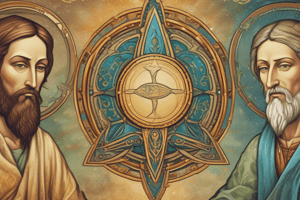Podcast
Questions and Answers
Questions are hidden until you start the quiz
Flashcards are hidden until you start studying
Study Notes
Worship as Participation in the Life of God
- The Christian doctrine of the Trinity is a dynamic understanding of the love within God, shared, poured out, and overflowing to embrace all creation.
- Worship is a response to the invitation to join in the Trinitarian dance of love.
- Rublev's icon with the space at the table for a fourth person, the viewer, expresses this sense of hospitality and invitation to join in the life of God.
Worship as Gift and Response to Gift
- At the heart of Christian understanding of worship is the awareness that what God does for us is prior to what we do for God.
- All life is a gift; we receive everything freely from God, and worship is a joyful recognition of this dependence.
- A theology of worship begins with a sense of God's gracious gift, and all Christian worship is charismatic, meaning it is a gift.
- Piero della Francesca's picture "The Baptism of Christ" suggests the aspects of God's gracious gift, including the resistance to evil and the pursuit of justice.
Worship as the Foundation of Community
- Worship is not just about attitudes and feelings; it is about practice and the nature of the communities we build.
- At the heart of the Old Testament is the conviction that Torah is not simply a legal system but a living relationship with God in which worship and action, piety and justice, belong together.
- Leonardo da Vinci's "The Last Supper" reminds us that the basis of Christian community is defined and re-enacted through a shared meal with great symbolic significance.
- Jesus gives himself to his disciples, then and now, to make them into his body on earth, characterized by trust and forgiveness.
Worship as a Sign and Foretaste of the Kingdom
- Worship is a witness and proclamation, a sign and an invitation, transforming people into encounters with God.
- Carvaggio's "The Supper at Emmaus" summarizes the idea of worship as a transforming event where people are brought into encounter with God and changed.
- The picture shows the risen Christ suddenly recognized as being in the disciples' midst, and the world is transformed, symbolizing the joyous revelation of God.
Worship as the Praise of Heaven and Earth
- There is a strong Christian tradition that speaks of worship as a mirror of the life of heaven.
- The Eucharistic prayer calls us to join with "angels and archangels and all the company of heaven" in a great vibrant continuous song of praise.
- Botticelli's "Mystic Nativity" gives a powerful sense of the two realms – the earthly and heavenly – co-existing side by side, inspiring us to join in praise and adoration.
Worship as Offering Our Service
- Worship celebrates God's gift through the service (latreia) of God.
- To address someone as 'your worship' is to say that they are a person of worth.
- The Greek word doxa (glory) has its roots in the idea of giving someone their proper due.
- Worship serves God by placing God at the centre of our lives and honouring him above all things.
Worship as Resistance
- When Christian worship makes the praise of God central to the whole of life, it is doing something radical and challenging.
- Worship asserts that God is worthy of praise, but also that no other power or system can claim our allegiance or worship.
- All kinds of idolatry are challenged and confronted in Christian worship, representing resistance to all that denies God's intentions for his world.
Studying That Suits You
Use AI to generate personalized quizzes and flashcards to suit your learning preferences.
Description
Explore the concept of worship as participation in the life of God through the Christian doctrine of the Trinity. Learn how worship is a response to the invitation to join the Trinitarian dance of love, as symbolized in Rublev's icon. Delve into the meaning of 'liturgy' and the significance of hospitality and inclusivity in the worship setting.




